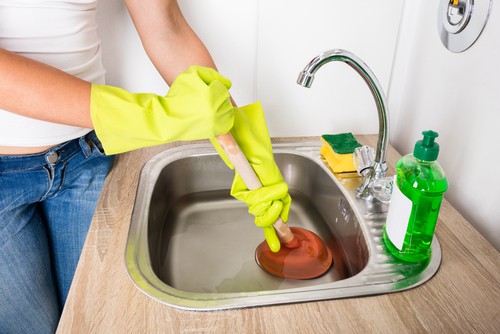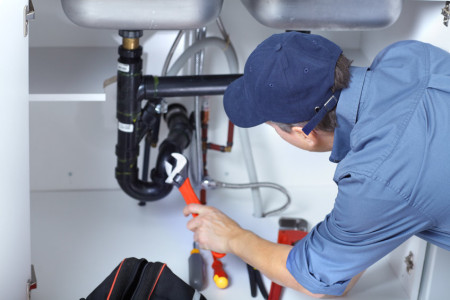Fast Fixes for Plumbing Emergencies: What to Do Until Support Arrives
Fast Fixes for Plumbing Emergencies: What to Do Until Support Arrives
Blog Article
The writer is making a few good observations on What to Do While Waiting for an Emergency Plumber in general in this great article which follows.

Plumbing emergency situations can strike at any moment, triggering stress and possible damages to your home. Whether it's a ruptured pipe, a blocked drainpipe, or a leaking faucet, knowing how to manage the scenario till an expert plumbing arrives can save you from more issues. This post offers vital emergency situation pipes suggestions to help you mitigate damages and reclaim control throughout a plumbing dilemma.
Shut off the Water Supply
The very first step in any kind of plumbing emergency is to shut down the supply of water. For localized concerns, such as a dripping faucet or commode, shut off the valve near the component. When it comes to a major leakage or burst pipe, locate your home's major water shut-off shutoff and turn it off quickly. Understanding the location of these shutoffs in advance can conserve useful time throughout an emergency situation.
Address Little Leaks with Momentary Fixes
Tiny leaks can quickly end up being significant troubles if left unattended. Make use of these short-term solutions up until professional assistance arrives:
While these repairs aren't irreversible, they can assist decrease water loss and damage.
Unclog Drains Pipes Safely
A blocked drainpipe can be an aggravating and unpleasant issue. Right here's just how to tackle it:
If these techniques do not function, avoid utilizing too much force, as it might get worse the blockage.
Handle Overflowing Toilets
An overruning toilet can trigger prompt mayhem. Below's what you should do:
Turn off Your Water Heater
In certain emergencies, such as a burst pipeline, it's important to shut off your water heater. This stops overheating or damage to the system when water stops flowing. Turn off the power supply to the water heater (electric or gas) and let it cool down to avoid possible threats.
Momentarily Stop a Burst Pipe
A burst pipeline can bring about substantial water damages in mins. To alleviate the problem:
Call a professional plumbing professional quickly to attend to the issue permanently.
Handle Frozen Pipes Meticulously
In chillier climates, frozen pipelines are a typical emergency. If you suspect an icy pipe:
Protect against Additional Damage
Taking fast action to decrease damages can save you money and time in the long run. Below's exactly how:
. Have an Emergency Situation Plumbing Set
Prepare a basic pipes emergency set to handle minor concerns efficiently. Your package ought to consist of:
Having these tools handy can make a significant difference in your capacity to manage emergency situations.
Know When to Call a Specialist.
While quick fixes can assist momentarily, certain plumbing problems call for immediate expert focus. Call a plumbing if:.
Without delay speaking to a professional makes sure the concern is resolved properly and stops additional difficulties.
Conclusion.
Plumbing emergencies can be frustrating, yet with the appropriate understanding and devices, you can take care of the situation efficiently up until assistance gets here. By switching off the water supply, dealing with little leaks, and utilizing momentary solutions, you can decrease damages and maintain your home safe. Bear in mind, these pointers are short-term services; always seek advice from an accredited plumbing professional to take care of the origin of the trouble. Prep work and fast reasoning are your ideal allies in any kind of pipes emergency situation.
Expert Tips for Emergency Plumbing Repairs
Plumbing emergencies can be incredibly stressful and inconvenient. Whether it’s a burst pipe, a clogged drain, or a leaky faucet, these common plumbing emergencies need immediate attention to prevent further damage to your home. But before you panic, it’s important to understand the basics of plumbing repairs and the steps you can take to address these emergencies. In this article, we will share some expert tips to help you navigate through these situations and minimize potential water damage.
Identifying Common Plumbing Emergencies
Leaky pipes and faucets Clogged drains and toilets Burst pipes Low water pressure Water heater problems Essential Tools for Plumbing Repairs
Plunger: Useful for unclogging toilets and drains Adjustable wrench: Needed for tightening or loosening nuts and bolts Pipe wrench: Ideal for gripping and turning pipes Tape measure: Necessary for accurate pipe measurements Plumber’s tape: Helps create watertight seals Understanding Emergency Plumbing Services
Emergency plumbing services are designed to provide immediate assistance for unexpected plumbing issues that can cause significant damage to your home, business, or health. These services are typically available 24/7 and are staffed by experienced plumbers who can quickly diagnose and repair a wide range of plumbing problems.
When a plumbing emergency strikes, time is of the essence. Whether it’s a burst pipe flooding your basement or a gas leak posing a serious risk, emergency plumbing services ensure that help is just a phone call away. These professionals are equipped with the tools and expertise to handle any situation, minimizing damage and restoring your plumbing system to proper working order.
What Constitutes a Plumbing Emergency?
Burst pipes or water supply lines: These can cause extensive water damage and need immediate repair to prevent flooding. Gas leaks or suspected gas leaks: Gas leaks are extremely dangerous and require prompt attention to avoid potential explosions or health hazards. Sewer backups or overflows: These can lead to unsanitary conditions and significant property damage. Clogged drains or toilets causing water to overflow: Overflowing water can damage floors, walls, and other structures. Leaks or water damage causing structural damage: Persistent leaks can weaken the structural integrity of your home or business. No hot water or heating: A lack of hot water can be more than an inconvenience, especially in colder months. Common Causes of Plumbing Emergencies
Aging or corroded pipes: Over time, pipes can deteriorate, leading to leaks or bursts. Improperly installed or maintained plumbing fixtures: Faulty installations or lack of maintenance can result in unexpected failures. Tree roots or other debris infiltrating your sewer line: Roots can grow into pipes, causing blockages and backups. Frozen pipes or water supply lines: In colder climates, pipes can freeze and burst, leading to significant water damage. High water pressure or sudden changes in water pressure: Excessive pressure can strain pipes and fixtures, causing them to fail. Natural disasters such as floods or earthquakes: These events can disrupt your plumbing system and cause severe damage. Steps to Minimize Water Damage
Locate the water shut-off valve: Knowing where the valve is can help you quickly cut off the water supply to the affected area. Turn off the water heater: If there’s a risk of water coming into contact with the heating element, make sure to turn off the water heater to avoid potential accidents. Open faucets and drain pipes: By opening faucets and drain pipes, you can relieve pressure and empty any standing water. Collect and contain water: Use towels, buckets, or bins to collect water and prevent it from spreading to other areas of your home. https://leecountyplumbingandwellservice.com/expert-tips-for-emergency-plumbing-repairs/

I'm certainly very occupied with What to Do During a Plumbing Emergency and I really hope you enjoyed reading our blog posting. Make sure you take the time to promote this blog posting if you enjoyed reading it. Thank you for your time. Kindly stop by our blog back soon.
Website Report this page